Vietnam Crypto Regulation Comparison Tool
Regulatory Impact Calculator
Compare Vietnam's Directive 05/CT-TTg requirements with other Southeast Asian countries to understand the significant differences in licensing, capital, and ownership rules.
Key Differences
What This Means
With Vietnam's 10 trillion VND ($379M) capital requirement versus Thailand's $13.7M, Vietnam's regulations make it nearly impossible for small and medium exchanges to compete. The foreign ownership cap of 49% in Vietnam creates a significant barrier to international participation, unlike Singapore's 100% foreign ownership allowance. Vietnam's mandatory VND trading requirement (63% of transactions in 2024) effectively bans stablecoins and pushes users toward state-controlled infrastructure.
Comparison Table
| Vietnam | Thailand | Singapore | |
|---|---|---|---|
| Minimum Capital Requirement | $379,000,000 | $13,700,000 | $25,000,000 |
| Foreign Ownership Limit | 49% | 100% | 100% |
| VND Trading Required | Yes | No | No |
| Stablecoin Acceptance | Banned | Allowed | Allowed |
| Estimated Market Users | 5M | 15M+ | 50M+ |
On September 9, 2025, Vietnam took a bold step into the future of digital finance - not by embracing crypto freedom, but by locking it down. Directive 05/CT-TTg, officially known as Resolution No. 05/2025/NQ-CP, didn’t just regulate cryptocurrency exchanges. It rewrote the rules entirely, turning what was once a wild, unregulated market into a tightly controlled state experiment. For the first time, Vietnam is legally recognizing crypto as an asset class - but only if you can afford to play by its terms.
Who Can Even Apply for a License?
The minimum capital requirement? 10 trillion VND - roughly $379 million USD. That’s not a typo. It’s more than 27 times higher than Thailand’s requirement and over 27 times greater than Singapore’s baseline for payment providers. This isn’t a barrier - it’s a wall. Only a handful of entities, likely state-backed or deeply connected conglomerates, have the resources to meet it. Small exchanges? The ones that served thousands of users with low fees and fast service? They’re out. One Reddit user, HanoiTrader88, put it plainly: he ran a profitable exchange with $190,000 in capital. Now, he needs $378.8 million more or shut down.
And it’s not just about money. At least 65% of that capital must come from Vietnamese institutional investors. Foreign ownership? Capped at 49%. No exceptions. This isn’t about protecting local businesses - it’s about control. The government wants Vietnamese entities to own the infrastructure, even if they’re borrowing the tech from abroad.
Only Vietnamese Dong - No Exceptions
Forget USDT, BTC, or ETH as settlement currency. Under Directive 05, every trade, deposit, and withdrawal must happen in Vietnamese dong (VND). No foreign currency conversions allowed on licensed platforms. This rule alone will push most international traders away. Stablecoins - which made up over 63% of all crypto transactions in Vietnam last year - are banned if they’re backed by fiat. That means USDT, USDC, and DAI? Officially out. Platforms must now create tokenized assets backed by real physical goods or commodities, something no one in Vietnam has done at scale yet.
Why? The State Bank of Vietnam has long feared capital flight. In 2024, an estimated $10.2 billion flowed out of Vietnam through unregulated crypto channels. By forcing all activity into VND, the government ensures every transaction stays within its surveillance net. It also means Vietnamese users can’t hedge against inflation using stablecoins - a major blow for those who’ve relied on crypto to protect savings in a volatile economy.
Blockchain, But Only Vietnam’s Blockchain
All licensed exchanges must use the NDAChain, a state-developed blockchain launched in July 2025. It’s not just a technical requirement - it’s a political one. NDAChain gives regulators full visibility into every transaction, wallet address, and transfer. There’s no privacy here. Even if you’re trading legally, the government sees everything. This isn’t DeFi. It’s state-monitored finance.
Plus, platforms must comply with Vietnam’s National Cryptography Standard (TCVN 13057:2025), a domestic encryption protocol developed by the Ministry of Information and Communications. No foreign security tools are permitted. This means even if a company wants to use a globally trusted KYC provider, it must rebuild its entire identity verification system from scratch using Vietnamese-approved tech.
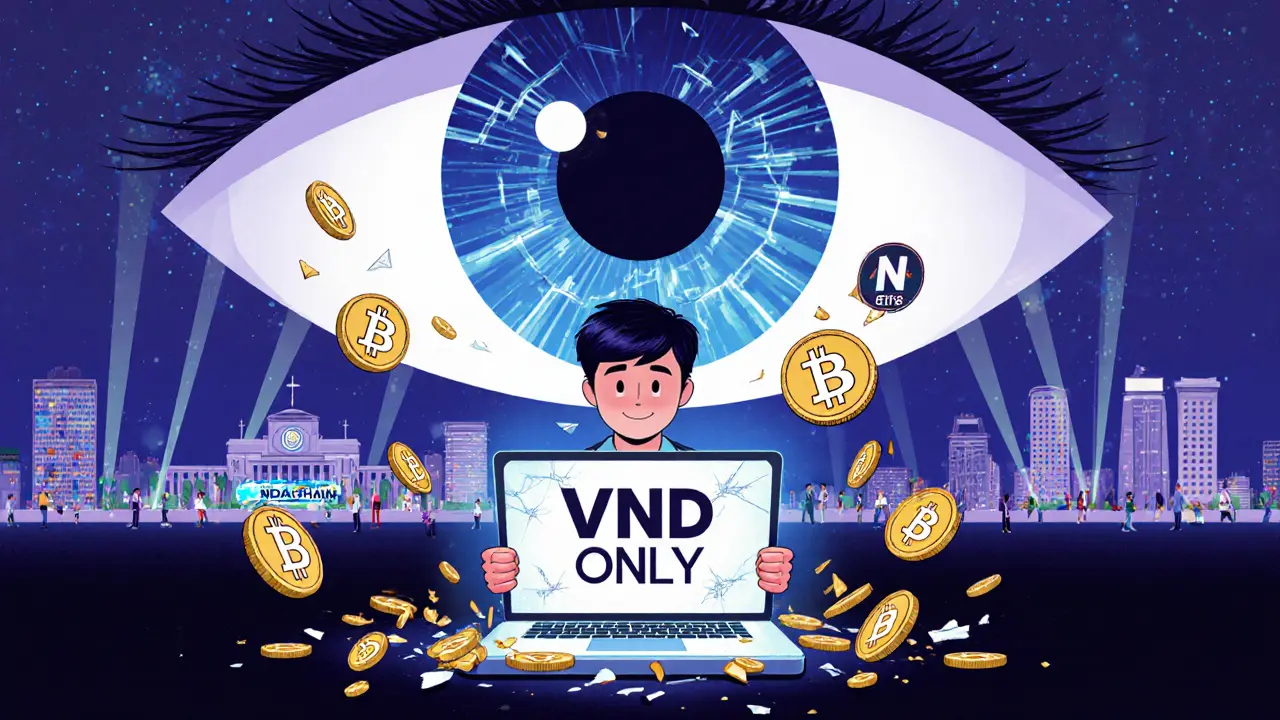
Who’s Left Standing After the Shakeout?
Right now, Vietnam has an estimated 21 million crypto users. That’s 21.6% of the population - second only to Ukraine globally in adoption rate. But under this new framework, only 3 to 5 exchanges will qualify for licenses in the first year. Those platforms will serve maybe 5 million users at most. What happens to the other 16 million? They’ll either go offshore, use peer-to-peer (P2P) networks, or stop trading altogether.
Statista estimates 18-20 million users could be displaced in the transition. Trustpilot reviews from unlicensed platforms show users love them for low fees (0.15% vs global 0.25%) and fast service. But they hate the delays - withdrawals took an average of 18.7 hours. Now, even those who were frustrated with the old system are worried. A CoinGeek survey found 79.6% of users think the capital requirement is too high. And 41.2% say they’ll move to offshore platforms if domestic options become too restricted.
Why This Isn’t Just About Crypto
This isn’t a crypto regulation. It’s a digital sovereignty play. Vietnam’s Digital Technology Industry Law, passed in June 2025, lists blockchain as one of eleven priority technologies - alongside AI and semiconductors. The government isn’t trying to stop crypto. It’s trying to own it. By forcing everything into VND, NDAChain, and state-approved capital structures, Vietnam is building a closed-loop digital economy. One where it controls the money, the data, and the infrastructure.
Compare this to Thailand, which licensed 12 exchanges with a $13.7 million capital requirement. Or Singapore, which welcomes global players with flexible rules. Vietnam chose a third path: not open, not closed - but controlled. It’s a middle ground between China’s ban and Singapore’s openness. But it’s closer to China in spirit: if you can’t be trusted to operate freely, you won’t be allowed to operate at all.
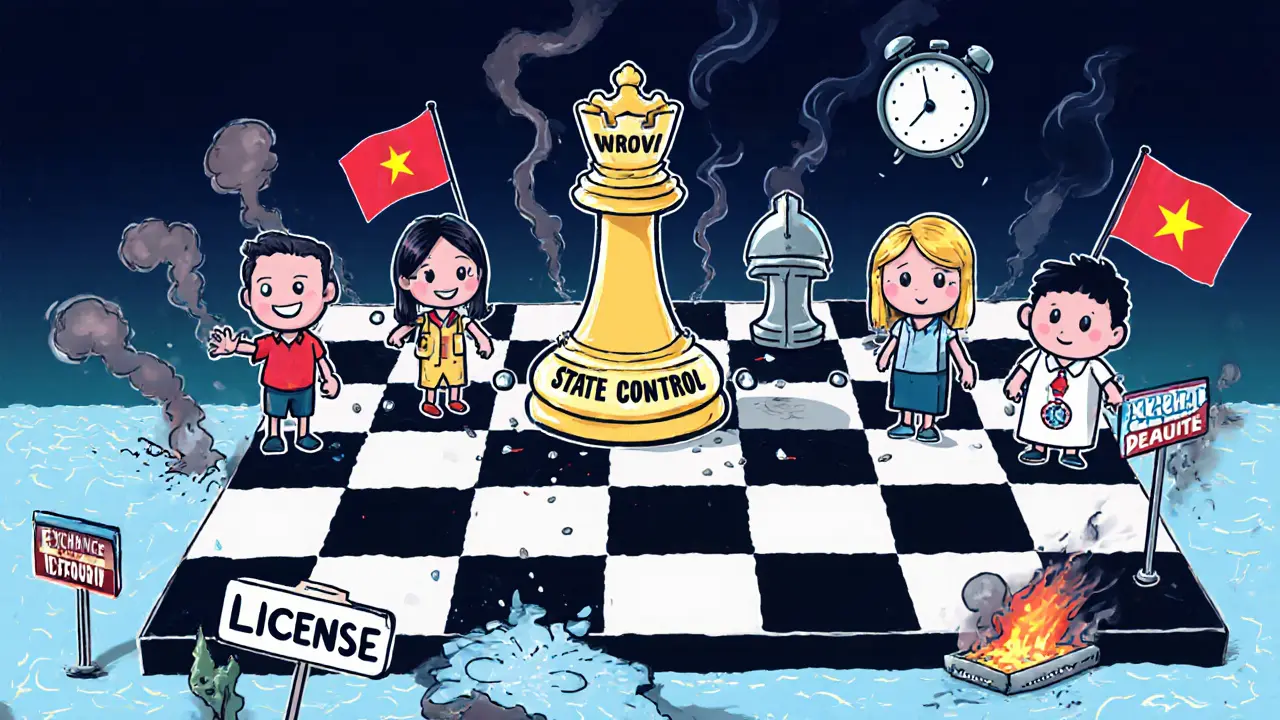
The Human Cost of Control
Behind the numbers are real people. A small business owner in Da Nang who built a crypto education platform with 5,000 students now has to shut down. A college student in Hanoi who used crypto to send money home to his family in Quang Ngai now has no legal way to do it. An investor in Ho Chi Minh City who lost $455,000 in a scam exchange last year finally feels safe - but only because the market just got 80% smaller.
Dr. Nguyen Minh Tuan of Vietnam National University says the high capital requirement prevents another 2022-style collapse, when 15 unregulated platforms vanished overnight. He’s right. But he’s also ignoring the fact that regulation doesn’t eliminate risk - it just shifts it. Now, the risk isn’t from shady startups. It’s from a single, state-controlled system. If one licensed exchange fails - or if the government freezes accounts - millions could lose access overnight.
What Comes Next?
The Ministry of Finance says license applications will open within 30 days. First licenses? Expected in 90-120 days. But compliance costs? Between $1.9 million and $7.6 million per platform. That’s not just capital - that’s time, legal fees, system rebuilds, and staff retraining. The six-month grace period after the first license is issued? Industry experts say it’s too short. Many platforms won’t be ready.
Tax rules are coming too. By November 15, 2025, the government will finalize capital gains taxes: 0.1% for trades under 100 million VND, 0.3% for larger ones. That’s low - but it’s still a tax on activity the state didn’t recognize until last month.
The five-year pilot will be reviewed at 12, 24, and 36 months. Will the capital requirement drop? Will stablecoins be allowed? Will foreign ownership increase? No one knows. But one thing is certain: the window for organic, grassroots crypto growth in Vietnam is closed.
This isn’t the future of crypto. It’s the future of state-managed digital finance - and Vietnam is leading the way in Southeast Asia.
What is Directive 05/CT-TTg?
Directive 05/CT-TTg, also known as Resolution No. 05/2025/NQ-CP, is Vietnam’s first formal licensing framework for cryptocurrency exchanges. Issued on September 9, 2025, it mandates strict capital, ownership, and operational rules for all crypto platforms operating in the country. It officially recognizes crypto as a regulated asset class but imposes severe restrictions to ensure state control.
Why is the capital requirement so high?
The 10 trillion VND ($379 million) minimum capital requirement is designed to prevent the collapse of unregulated exchanges that occurred during the 2022 crypto crash, when 15 platforms disappeared and over 500,000 users lost money. The government believes only large, well-funded entities can provide stability. Critics argue it’s meant to eliminate competition and create a state-backed oligopoly.
Can I still trade crypto in Vietnam?
Yes - but only through licensed exchanges that meet the new rules. All trading must happen in Vietnamese dong (VND), and you can’t use stablecoins backed by US dollars or other fiat currencies. Unlicensed platforms are now illegal. Many users are expected to move to offshore exchanges or use peer-to-peer networks to continue trading.
Are stablecoins banned in Vietnam?
Yes. Directive 05 explicitly prohibits crypto assets backed by fiat currencies or securities. This means USDT, USDC, DAI, and similar stablecoins are not allowed on licensed platforms. This is one of the most restrictive aspects of the framework, as stablecoins made up over 63% of all crypto transactions in Vietnam in 2024.
Will this regulation make crypto safer in Vietnam?
It will reduce the risk of scams from small, unregulated platforms - which is a real problem. But it creates new risks: a single point of failure. If the state-controlled system fails, freezes accounts, or is hacked, millions could lose access. The trade-off is security for control - and many users are unsure if that’s worth losing the freedom they had before.
How many crypto users will be affected by this?
Vietnam has about 21 million crypto users. Only 3-5 exchanges are expected to qualify for licenses in the first year, serving perhaps 5 million users. That means 16 million people could be pushed out of the legal market - either moving offshore, using P2P networks, or stopping trading entirely.
What’s the timeline for implementation?
License applications open within 30 days of the resolution’s issuance. First licenses are expected in 90-120 days after applications begin. A six-month grace period follows the first license issuance, during which unlicensed platforms must shut down. Tax rules for crypto will be finalized by November 15, 2025.
Is Vietnam the only country with these rules?
No - Indonesia also requires local currency trading, and China bans exchanges outright. But Vietnam’s combination of ultra-high capital requirements, foreign ownership caps, fiat-backed asset bans, and state-controlled blockchain is unique in Southeast Asia. It’s more restrictive than Thailand or Singapore, but less extreme than China’s total ban.






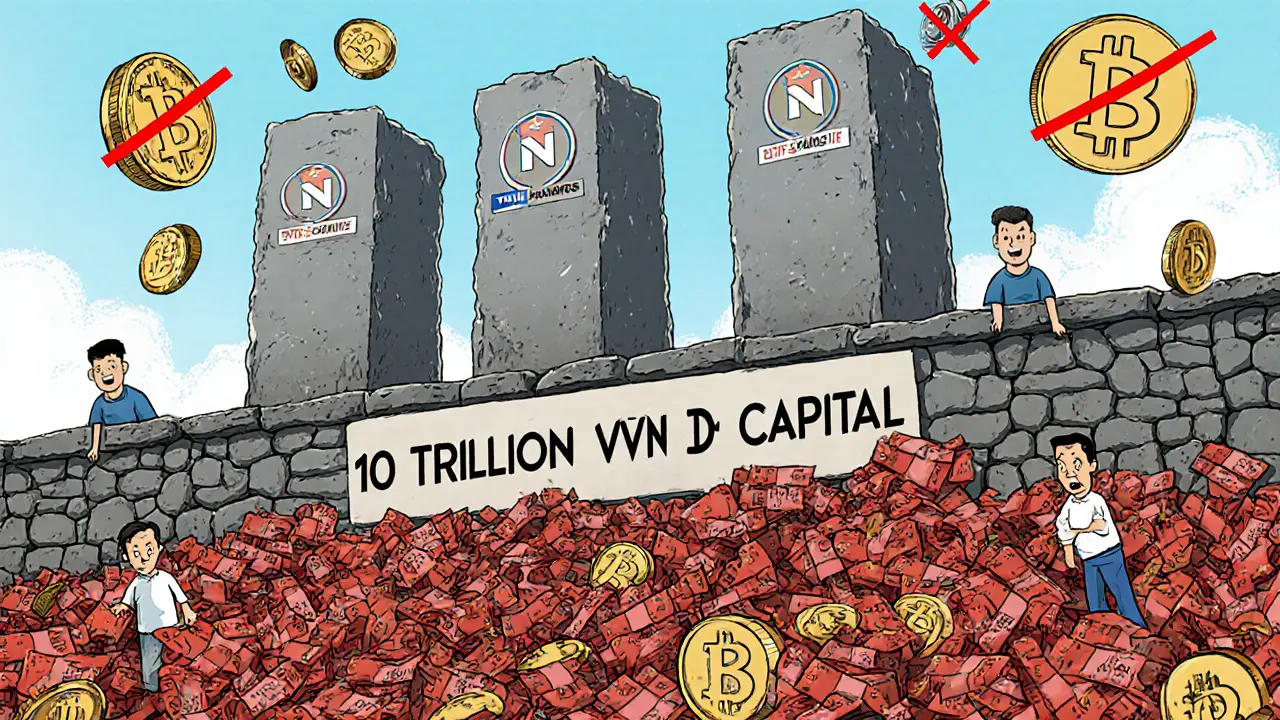

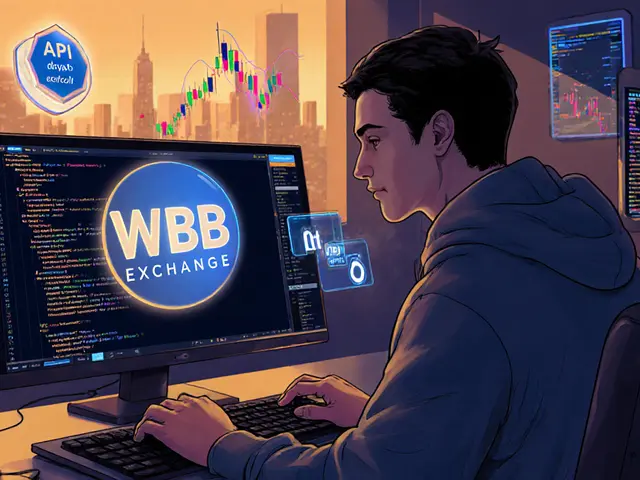
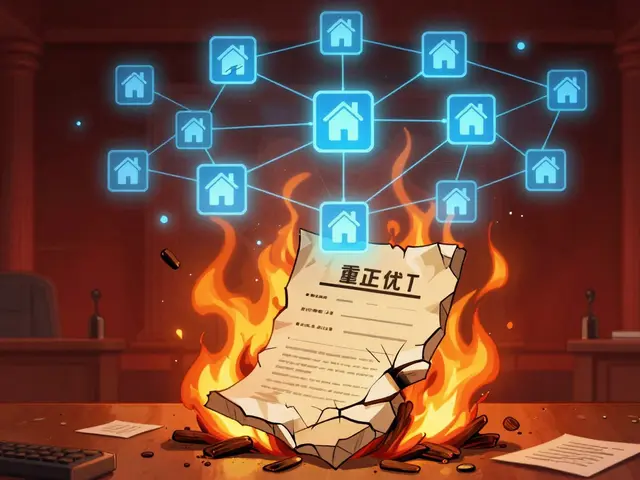
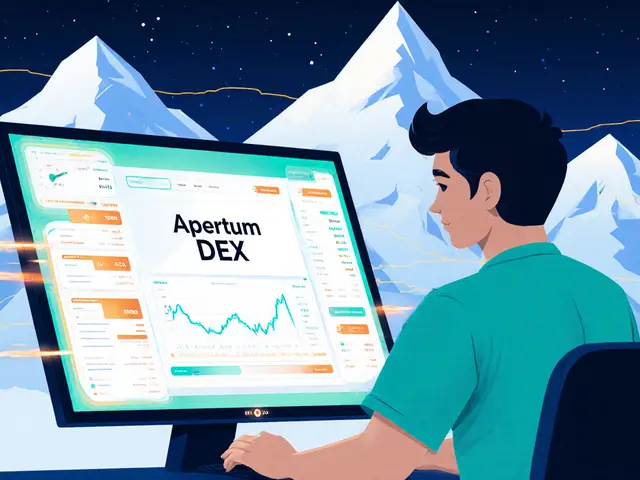

People Comments
They’re not regulating crypto they’re building a digital gulag and calling it progress
Let’s be real-this isn’t about financial stability. It’s about the state asserting monopolistic control over digital capital. The 10-trillion-VND threshold is a deliberate exclusionary tactic, not a safeguard. When you force every transaction through NDAChain and ban stablecoins, you’re not protecting users-you’re turning crypto into a state-run utility where privacy is extinct and innovation is neutered. This is Venezuela 2.0 with better UI design.
I get why they’re doing this-after the 2022 collapses, trust is shattered. But locking out 16 million users doesn’t fix the problem, it just pushes it underground. P2P networks are already booming. The real win would’ve been phased licensing, education, and sandboxed innovation-not a hard wall. Vietnam could’ve been the Singapore of Southeast Asia. Instead, they’re becoming the China of crypto with extra bureaucracy.
Good. Let them go to Dubai. Vietnam doesn’t need crypto anarchists.
Finally! Someone’s got balls. Crypto was always a Western scam-now Vietnam’s taking back its financial sovereignty. No more USDT laundering, no more offshore tax evasion. This is economic patriotism. And if you can’t afford the license? Maybe you weren’t meant to play with the big kids anyway. 💪🇺🇳
Oh, please. The capital requirement is absurd. It’s not about protection-it’s about creating a cartel of state-approved oligarchs who’ll charge 5% fees and call it ‘security.’ And don’t get me started on NDAChain-this isn’t blockchain, it’s a surveillance ledger with a fancy name. If you think this will stop capital flight, you’ve never heard of Phantom Wallets or Telegram bots. This is theater. The government wants to look like it’s in control-even if the system collapses under its own weight.
imagine being so scared of crypto that you make a national blockchain just to watch everyone’s trades 😭 i mean… cool? but also… why???
Let me paint you a picture: A 19-year-old in Hue uses his mom’s rice money to buy BTC through a P2P app, then sends it to his cousin in Canada to pay for meds. That’s not ‘capital flight’-that’s survival. Now, thanks to Directive 05, he’s a criminal. Meanwhile, the same government that banned stablecoins just signed a $2 billion deal with a Chinese state-owned firm to build the NDAChain nodes. Oh, and guess who’s supplying the hardware? Yep. The same folks who built China’s Social Credit firewall. This isn’t sovereignty-it’s digital colonization with Vietnamese branding. They didn’t ban crypto. They just handed it to Beijing on a silver platter and called it ‘Made in Vietnam.’
It’s so sad to see this happen-Vietnam has such a vibrant, young crypto community, full of entrepreneurs and students just trying to learn and build. Instead of fostering that energy with sandbox programs or tiered licensing, they’ve built a fortress. I’m from India-we’ve had similar debates around UPI and crypto. But here, they’re not just regulating; they’re erasing the grassroots. And the worst part? The people who suffer most are the ones who trusted the system. The student who sent money home. The small shop owner who used crypto to pay suppliers. They’re not speculators-they’re users. And now they’re being punished for being loyal.
This is a psyop by the IMF and the Federal Reserve to destabilize emerging economies. The 49% foreign ownership cap? A distraction. The real agenda is to force Vietnam into a BRICS-aligned digital currency bloc. NDAChain is not a blockchain-it is a Trojan horse for the Chinese digital yuan. The State Bank of Vietnam is a puppet. The 21 million users? They are the collateral damage in a silent war for monetary hegemony. Do not be fooled by the rhetoric of ‘sovereignty.’ This is financial subjugation dressed in national pride.
Of course the government is scared. They know crypto exposes their corruption. Every VND transaction on NDAChain will be logged. They’re terrified someone will trace the bribes, the kickbacks, the offshore accounts of their cronies. This isn’t about control-it’s about hiding. They banned stablecoins because they can’t monitor the real value flow. And now they’re forcing everyone into VND so they can track every coffee purchase, every school fee, every secret transfer. This is the end of financial privacy. And they call it progress.
While I understand the government’s intent to prevent systemic collapse, the approach seems fundamentally misaligned with the nature of decentralized systems. By mandating state-owned infrastructure, eliminating foreign competition, and suppressing stablecoin innovation, the framework inadvertently incentivizes black-market activity and erodes trust in the very institutions meant to protect users. A more adaptive, risk-based regulatory model-perhaps with tiered licensing for small platforms-might have preserved both stability and innovation. As currently constructed, Directive 05 risks creating a brittle, centralized system that, if compromised, could trigger far greater damage than the unregulated market it replaced.
You’re all missing the point. This isn’t about crypto. It’s about the government finally realizing that the internet can’t be controlled unless the money is controlled. Every decentralized finance platform was a threat to their authority. Now they’ve weaponized regulation to turn a financial tool into a political instrument. And the irony? The only people who’ll ever use NDAChain are the ones already on the government payroll. Everyone else? They’ll be using GhostWallets and Telegram bots. The state thinks it’s winning. But it’s just creating the next generation of underground networks-more resilient, more anonymous, and more dangerous.